9th July 2025
Nine games made it onto the tables this session, mostly with an exploring or nature theme. Five new games and four back by popular demand.
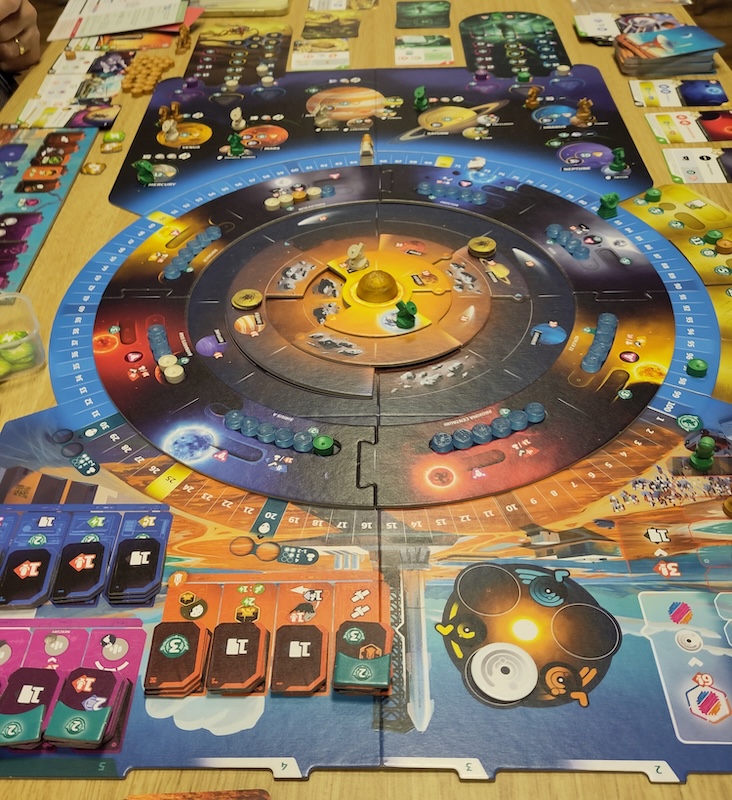
SETI: Search for Extraterrestrial Intelligence and Tycoon: India 1981 were the first to be setup having been pre-booked on Discord chat. Previously played in Session 99 SETI is a strategic card based game searching for signs of Alien life.
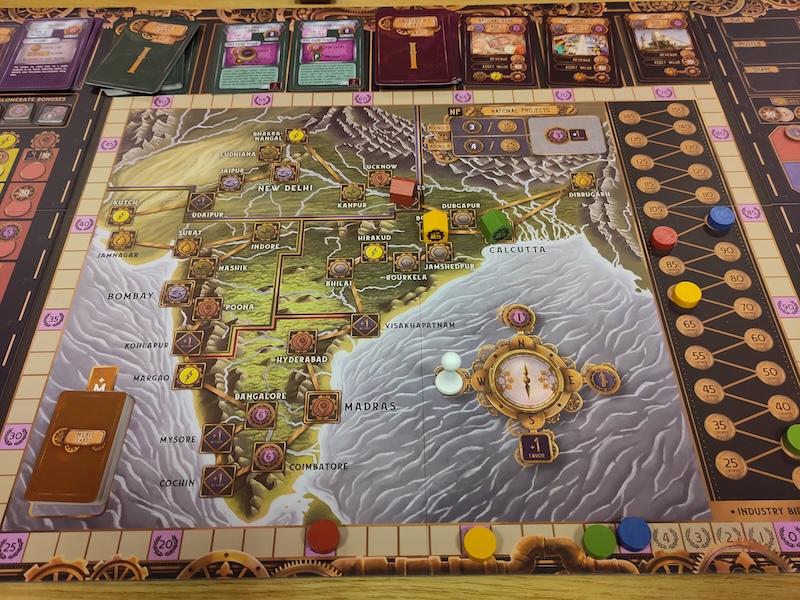
Four budding entrepreneurs decided to try Tycoon: India 1981 in a fitting, go-getter style by not reading the rules and just watching some online tutorials (with one brave soul just going with listening to a YouTube video in the car due to time constraints). In post colonial India industrial houses are trying to kick start a new industrial revolution and dominate the key sectors of minerals (rocky stuff), fuel (oily stuff), power (sparky stuff), transport (drivey stuff), agriculture (growey stuff) and finance (money stuff). Yes, it’s an economic game with auctions, shares, loans and a map of India to build factories on.
Over 7 rounds players are trying to gain assets and influence, along with governmental favour in case they can’t dominate both the other tracks. The map is split into 4 regions, each giving certain bonuses, and the current tycoon (whoever placed the highest industrial bid that round) choosing which region is active. Government policies can be bid on in a closed bid using their promoters (lobbyists), where as industries are an open bid using money over 2 rounds of bidding, with the top two bidders winning industries they can later build. After the bidding phases comes the action phase, where we get 2 actions (3 for the current tycoon) – build an acquired industry, buy a share in an opponents’ company, muster promoters into the strategy pool for later use, use your policy cards, take out a loan or use your promoters for a strategic action (gain money, bank an extra action, or buy an industry at an inflated price).
With Simon joining later, Jyo, Steve and Darren set the board up ahead of time and familiarised themselves with the layout, then enjoyed some of the shorter games. After reconvening there was a brief overview of some of the salient points we could recall (with Simon seeming to have taken more on board even though he was the one who listened to a video rather than watch one) and the grand industrialisation began.
Early bidding wars saw Simon start building first in some prime locations, with Jyo and Steve following, whilst Darren looked to be creating a nice shares portfolio, all working towards their secret objectives as well as chasing rupees and influence. Simon was also collecting plentiful favours, hoping that would help form a decisive victory. Steve was climbing the oily stuff track, looking to get kickbacks from those building in this industrial sector, Jyo grabbing some status in the agricultural sector, and chasing Steve in Fuel to stop him gaining too many kickbacks. Darren was concentrating on the Finance track, hoping that would combine nicely with his shares, and Simon was just gaining points and leaving us in his dust.
There was a little confusion early on over some iconography, and Steve rightly pointed out that our take on it didn’t make a whole lot of sense, but we carried on regardless simply because we couldn’t figure out a better option.
This was a mistake.
Around the halfway point it became clear that when we moved up the finance track we were supposed to gain additional asset values (tracked on our nifty little asset trackers), and not additional funds as we had been doing (corruption was rife in the banking world). Those who hadn’t taken multiple loans, or who hadn’t been climbing up the finance track could just about backtrack, but it proved impossible to payback the misappropriated money in Darren’s case (very corrupt), even with a loan to try and cover it. Figuring out what may have resulted from all the extra cash in the tight economy was also a bit problematical, so we made the decision to call it there, with Simon ahead on the score track, and resolved to have a rematch, and possibly a rules review too.
Cascadia Rolling Rivers and The Guild of Merchant Explorers were chosen by the other tables as shorter starter games.
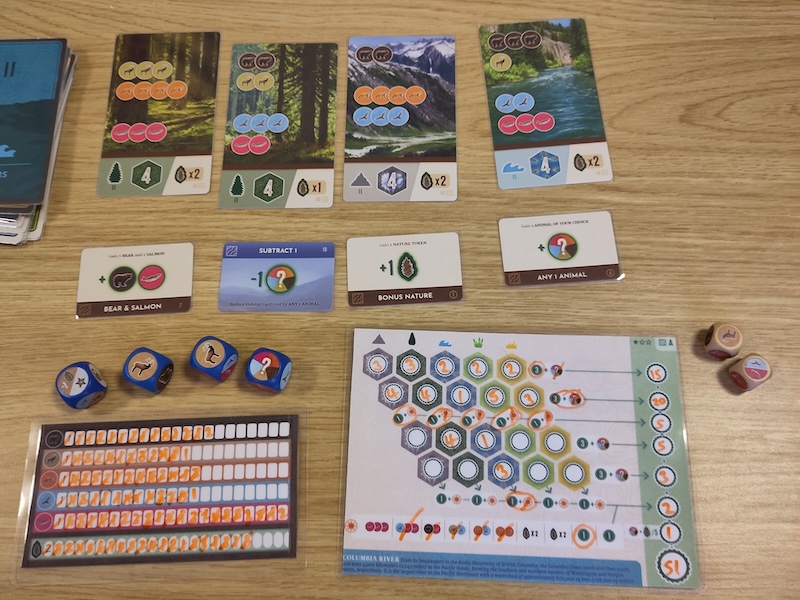
Cascadia Rolling Rivers is one of two roll and write variants of Cascadia the ecosystem building game which has been played at club in Session 71. In this version dice are rolled, 4 communal and 2 private, that are used to select one type of animal to collect that round. Unless nature bonus points are spent to modify those dice based selections. Then banked animals can be spent to meet the conditions on terrain cards that are then scored on the map sheets. There are 4 map sheets providing replayability and increased complexity in the map placement choices and strategy, but we stuck with the basic map in this teaching game. Played over twenty rounds if you do well with your animal selections you could score twenty terrain cards. Teachers curse struck again and new player Graham was the clear winner with the best range of the terrain card points banked on his map.
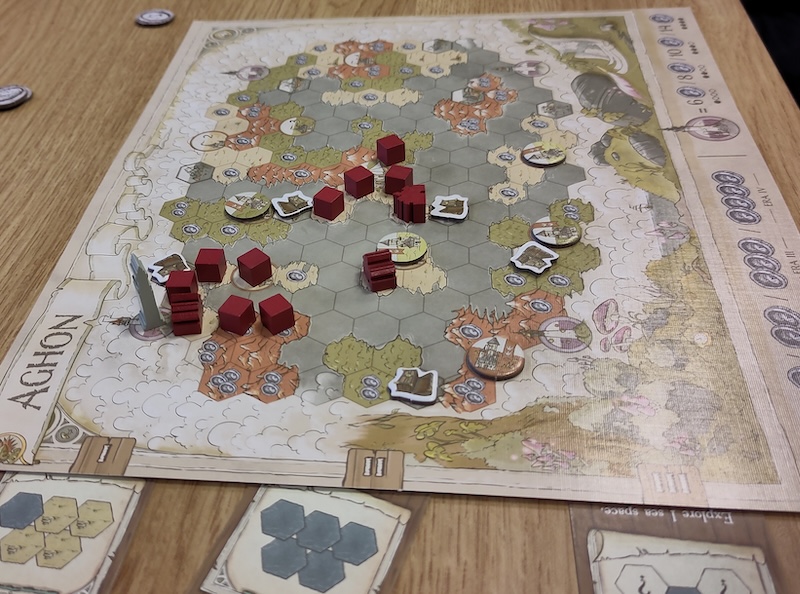
The Guild of Merchant Explorers had been played once before at Session 92. Players all start with the same map and have the same expansion options each round, so similar to roll and write games it is all about how you place your cubes each round to maximise the scores from trading and finding treasures.
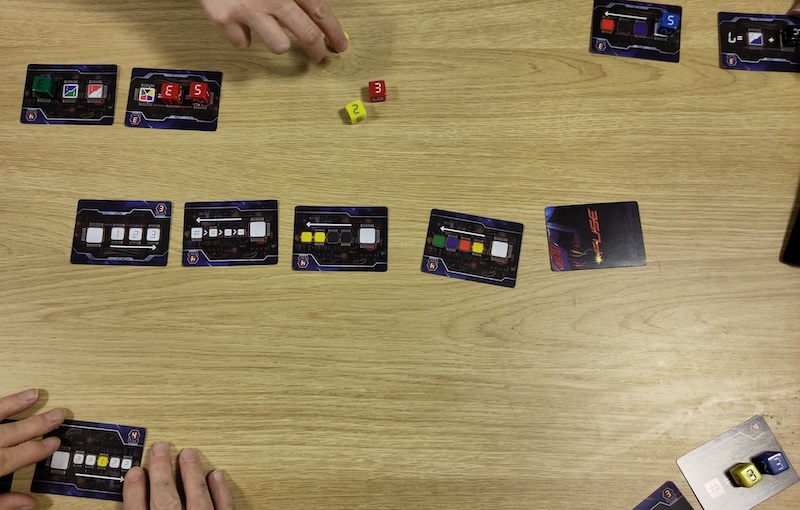
Late joiners tried cooperative fast decision making FUSE where you have 10 minutes to defuse all the bombs. Bombs are cards with certain dice requirements and you have little time to maximise the dice amongst the players to get all the required combinations. Fortunately as this was a game there were no real bombs since despite three plays the bomb defusal teams didn’t manage to defuse all the bombs but had fun trying.
Then those tables reshuffled into Forest Shuffle and Space Base. Both these games were popular at the online Board Game Arena sessions and the physical versions have been acquired and are becoming regulars at club nights too.
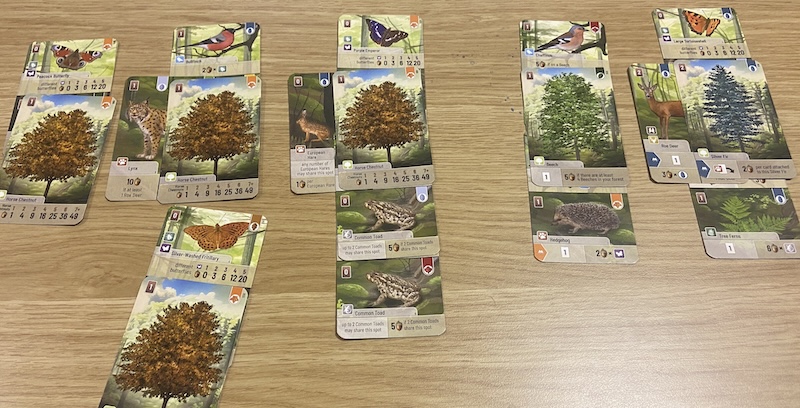
Kathy J. tried to teach Forest Shuffle to three new players based on this online experience, fortunately it is quite a logical card game and the text on the cards is pretty self explanatory though there were a few times the rule book was required to work out the order of certain triggers that the computer would have usually dealt with. Richie and Graham went with a tree heavy strategy, Richie managed the eight different trees collection and four beech trees while Graham went for the Horse Chestnuts and the powerful score accumulator for those. Kathy J. started trying similar but realised there was too much competition and to go for a smaller forest but with lots of wildlife. The early pickups provided a hedgehog, quite a few butterflies and an insect eating bird which was quite a nice pairing. Then a Roe deer with a preference for animals that liked silver birch which led to five other card pickups to match that including a lynx that liked eating Roe Deer. Nature can be brutal. In the final scoring Kathy’s good top/bottom animal scores were just enough to fend off the tree based scores beating Graham by 1 point and Richie by 3 points.
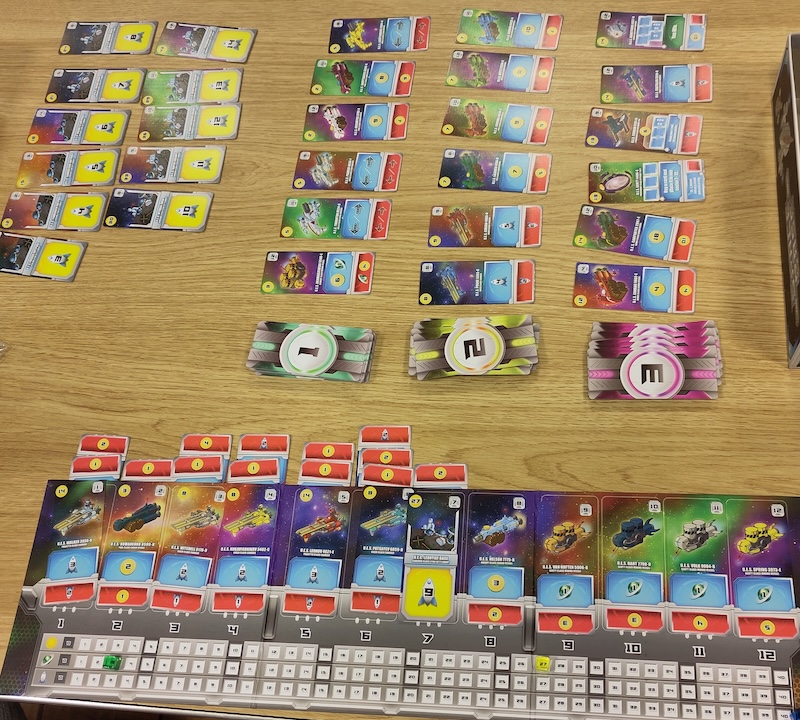
Space Base made its first physical appearance at club. It is a fun game of probability, in space! You have a tableau of 12 space ships that are numbered from one to twelve, and on your turn you roll 2 dice and choose either the sum of the dice or each individual dice and activate those ships you have at those numbers. At the start of the game they generally give you coins to be able to purchase better craft, but they can also increase your income, give you victory points or some other special abilities that usually need powering up. When you purchase a new vessel you deploy the current one, by flipping it upside down to show a new action that can be collected during other players turns - these are generally a less powerful version of the main action, but you can have multiple deployed ships of the same number and they all activate. With a good die range of deployed ships, you get more bonuses from other players die rolls. The aim of the game is to get to 40 victory points by creating a lucky dice fleet!
Two other fleet commanders - David and Jeremy - sat down for this challenge that James had brought. Even though Jeremy had launched into space before with this game online, James created a victory point maximiser fleet with every 6 rolled by David and Jeremy giving him 2 VPs, and nearly every die roll he rolled giving a few more. So the first game did not last very long, with David and Jeremy struggling to get about 15 points by the time James rolled over 40.
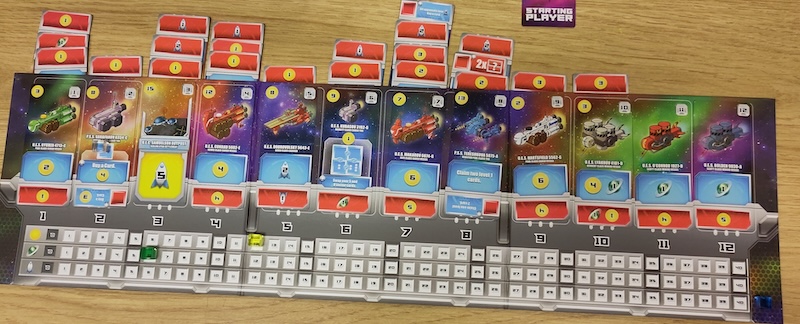
This didn’t deter our commanders and we warmed up the dice for another go, this time David and Jeremy both had better starts and James struggled to get going. David and Jeremy had a fleet that were giving a nice level of coins for upgrades and VPs, so were neck and neck in points. James tried for a different strategy and put it all on one special card that once powered up 4 times, he would win the game - he didn’t need those victory points any more! It came down to the wire as James had powered up his 12th ship 3 times, and on a roll of 10, 11 or 12 could win the game (due to some cunning special ship deployment), whilst Jeremy and David were both at about 35 points. Jeremy purchased a victory point ship (which gives you instant points, but if you roll that number on your turn it does nothing) but left him a couple of points shy of 40. James rolled a 9, which he couldn’t change into a winning power up. David’s roll gave Jeremy the necessary VPs from deployed ships to reach 40, but David also purchased an instant VP ship that brought him to 40. So we declared a combined win against James!
Closing short games for the night were Kingdomino (now on its thirteenth club play), FUSE (again) and Bites (a game about ants at a picnic).
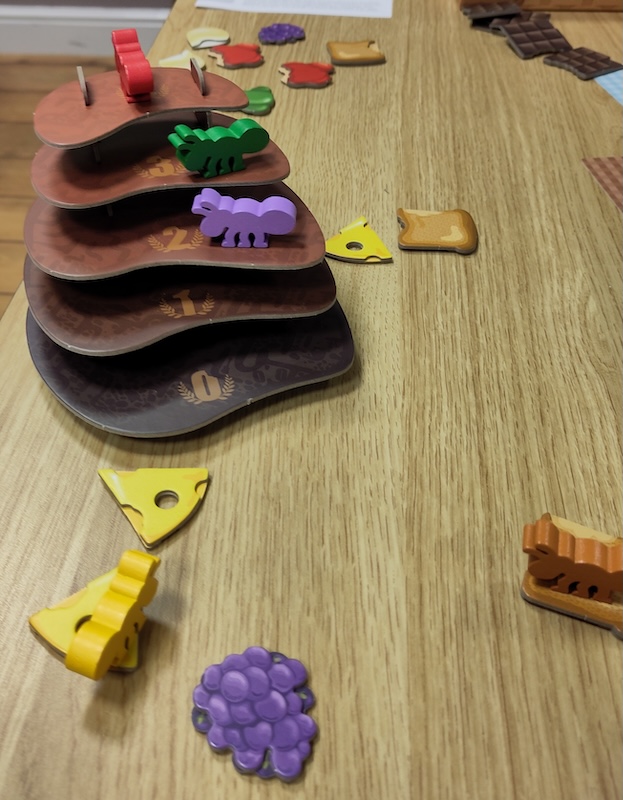
After playing through an economic game based on the industrialisation of India, a few players followed up with a light picnic. But they were tricked, because Bites is secretly a stock game. You move ants to eat food, but the number of points for each food type is determined by the players moving the ants… so you can try collect a lot of one type but then the other players can work together to make them worthless (the five types of food end up from zero to four points). There’s also chocolate and wine, the former giving a cool power and the latter having a strange scoring condition. Bites comes with a range of rules, for the chocolate, the wine, the value of food types, and the weird rule changes. It’s a fun little filler, with a surprising variety of types of game based on which rules cards are used. It does have the slight issue that setup can be almost as long as the game, but it’s a really nice edition of an older game with good chunky components and a pretty theme (plus an entirely unnecessary 3D cardboard anthill). Games are always close, and there’s a few “ah ha” moments as players work to counter each other.
The next session is the 23rd July. Which of the many games from the club regulars will be chosen then? If you want to influence those choices join us on the night or on the Discord channel which usually has some lively pre-session banter about game selections.
- Total Session Attendance: 14?
-
Board Games: